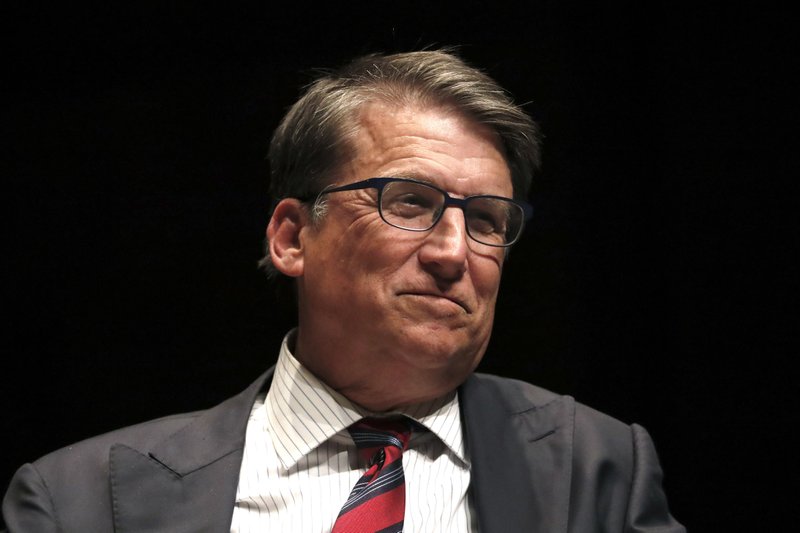A litany of lawsuits came in on Monday.
North Carolina Governor Pat McCrory sued the United States Department of Justice.
Leaders in both chambers of the state legislature, House Speaker Tim Moore and Senate President Pro Tem Phil Berger, also sued the Department of Justice.
And the Department of Justice sued back.
“They created state-sponsored discrimination against transgender individuals, who simply seek to engage in the most-private of functions in a place of safety and security,” said United States Attorney General Loretta Lynch. “A right taken for granted by most of us.”
Lynch was announcing the lawsuit against North Carolina claiming that the controversial House Bill 2 – passed in a whirlwind special session in late March – was “impermissibly discriminatory.”
Lynch said the issues with House Bill 2 went beyond what has drawn the most attention, that the law would require transgender individuals to use the bathroom that matches their birth certificate rather than their gender identity.
“This action is about a great deal more than bathrooms,” Lynch said. “This is about the dignity and the respect that we accord our fellow citizens and the laws that we, as a people and as a country, have enacted to protect them – indeed, to protect all of us.”
The lawsuits came after the DOJ sent letters last week to McCrory, the state Department of Public Safety and the UNC System. McCrory said the three business days that the state was given to respond before the Monday deadline was too much to meet and that the state had asked for a two-week extension.
“But they refused, unless I made a statement where I would publicly agree with their interpretation of federal law,” McCrory said. “And if I did, they would give me one additional week to respond.
“I could not agree to that because I do not agree with their interpretation of federal law.”
McCrory said it is up to the courts to interpret the law, not an agency under the Presidency of Barack Obama.
“We believe a court, rather than a federal agency, should tell our state, our nation and employers across the country what the law requires,” McCrory said.
Lynch pointed to a recent ruling from the 4th Circuit Court of Appeals, which has jurisdiction over North Carolina, which said a Virginia school board violated the rights of a transgender teen by not allowing him to use the bathroom of his choice.
Lynch then addressed North Carolinians specifically, as a North Carolina native herself.
“You have been told that this law protects vulnerable populations from harm, but that is just not the case,” Lynch said. “Instead, what this law does, is inflict further indignity on a population that has already suffered far more than its fair share.
“This law provides no benefit to society and all it does is harm innocent Americans.”
Lynch then turned her attention to transgender North Carolinians.
“We see you. We stand with you. And we will do everything we can to protect you going forward.”
McCrory maintained that this attention paid to North Carolina was the federal government “bullying” the state. Lynch disagreed.
“I think that the people who feel bullied are probably the transgender individuals who live in the state of North Carolina,” the US Attorney General said, “who live and work beside their neighbors without any problems and have done so for years and are now being singled out on something that they have no control over and is an essential part of who they are.”
The lawsuit from McCrory focused on the accusations of violating Title VII of the Civil Rights Act, while the lawsuit from Moore and Berger spoke to the wider claims of the original notice that HB2 also violated Title IX of the Education Amendments and the Violence Against Women Act.
Lynch did say on Monday that the department reserved the right to curtail federal funding to North Carolina, which could include billions of dollars going to the public school system in the Tar Heel state. That decision could impact K-12 schools and the University System. And newly-installed System President Margaret Spellings released a statement on Monday saying that the system will invite “greater dialogue” with the DOJ to resolve concerns over HB2. Spellings said that the system would work to comply with federal and state regulations, adding, “In these circumstances, the University is truly caught in the middle.”
The UNC Board of Governors has called a special session for Tuesday afternoon to get a legal briefing from the system’s general counsel.
While these lawsuits were all filed Monday, the original lawsuit from the national American Civil Liberties Union, the ACLU of North Carolina and Lambda Legal challenging House Bill 2 is still awaiting action from the court.
The cases could all eventually be merged for one ruling, but there is no timeline for any movement on the suits.


